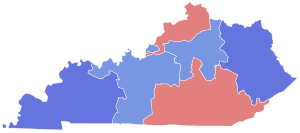
Anne Meagher Northup is an American Republican politician and educator from the Commonwealth of Kentucky. From 1997 to 2007, she represented the Louisville-centered 3rd congressional district of Kentucky in the United States House of Representatives, where she served on the powerful House Appropriations Committee. She lost reelection to Democrat John Yarmuth in the 2006 election. She then ran for Governor of Kentucky, losing by 15 points to embattled governor Ernie Fletcher in the Republican primary election for the 2007 Kentucky gubernatorial election. Prior to her election to the United States House of Representatives, Northup had served in the Kentucky House of Representatives. Northup ran again for her old congressional seat in the 2008 election, losing again to Yarmuth.

Ernest Lee Fletcher is an American physician and politician who was the 60th governor of Kentucky from 2003 to 2007. He previously served three consecutive terms in the United States House of Representatives before resigning after elected governor. A member of the Republican Party, Fletcher was a family practice physician and a Baptist lay minister and is the second physician to be elected Governor of Kentucky; the first was Luke P. Blackburn in 1879. He was also the first Republican governor of Kentucky since Louie Nunn left office in 1971.
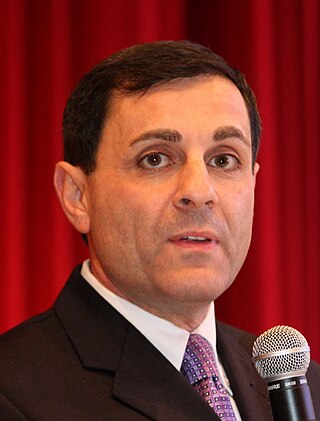
Frank Daniel Mongiardo is an American physician and politician from the Commonwealth of Kentucky. Mongiardo is a Democrat and was the 54th lieutenant governor of Kentucky from 2007 until 2011. He was a member of the Kentucky State Senate from 2001 to 2007. He also ran for the U.S. Senate in 2004, narrowly losing in the general election to Jim Bunning and again in 2010, losing in the primary election to Jack Conway.

Colonel Martha Layne Collins is an American former businesswoman and politician from the Commonwealth of Kentucky; she served as the state's 56th governor from 1983 to 1987, the first woman to hold the office and the only one to date. Prior to that, she served as the 48th Lieutenant Governor of Kentucky, under John Y. Brown, Jr. Her election made her the highest-ranking Democratic woman in the U.S. She was considered as a possible running mate for Democratic presidential nominee Walter Mondale in the 1984 presidential election, but Mondale chose Congresswoman Geraldine Ferraro instead.
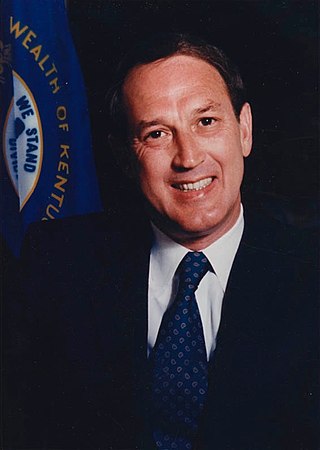
Wallace Glenn Wilkinson was an American businessman and politician from the Commonwealth of Kentucky. From 1987 to 1991, he served as the state's 57th governor. Wilkinson dropped out of college at the University of Kentucky in 1962 to attend to a book retail business he started. The business rapidly became a national success, and Wilkinson re-invested his profits in real estate, farming, transportation, banking, coal, and construction ventures, becoming extremely wealthy. In 1987, he joined a crowded field in the Democratic gubernatorial primary. After running behind two former governors and the sitting lieutenant governor for most of the race, Wilkinson began to climb in the polls after hiring then-unknown campaign consultant James Carville. Wilkinson campaigned on a promise of no new taxes and advocated a state lottery as an alternative means of raising money for the state. Wilkinson surprised most political observers by winning the primary and going on to defeat his Republican challenger in the general election.

The 2007 Kentucky gubernatorial election was held on November 6, 2007. In this election, incumbent Republican Governor Ernie Fletcher ran for reelection to a second term, but was soundly defeated by Democratic challenger Steve Beshear. A primary election to determine the Republican and Democratic nominees for governor was held on May 22, 2007, in which Fletcher and Beshear won their respective primaries. Steve Beshear's son, Andy, would also be elected to the same office 12 years later.
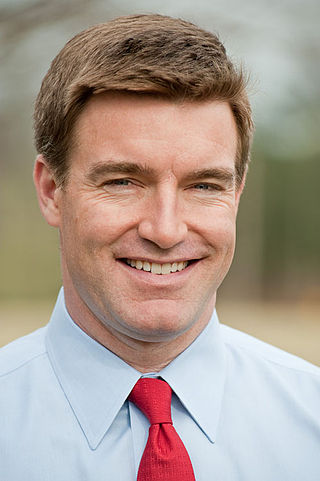
John William Conway is an American lawyer and politician from the Commonwealth of Kentucky. A member of the Democratic Party, Conway served as the 49th attorney general of Kentucky from January 7, 2008, to January 4, 2016. Prior to his election as attorney general, he was the nominee for Kentucky's 3rd congressional district in the 2002 elections, narrowly losing to Republican incumbent Anne Northup.
Harvey I. Sloane, a physician and Democrat, served two terms as Mayor of Louisville, Kentucky and also a term as county judge-executive of Jefferson County, Kentucky. He narrowly lost two Democratic primaries for Governor of Kentucky and lost a race for the United States Senate to incumbent Mitch McConnell.

Gregory D. Stumbo is an American lawyer and former speaker of the Kentucky House of Representatives. A member of the Democratic Party, he served as Kentucky attorney general from 2004 to 2008. He was the Democratic candidate for the 2019 election for Attorney General.
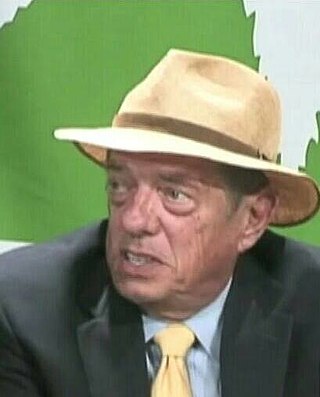
Louis Gatewood Galbraith was an American author and attorney from the U.S. Commonwealth of Kentucky. He was a five-time political candidate for governor of Kentucky.

The 2010 United States Senate election in Kentucky took place on November 2, 2010, alongside other elections to the United States Senate in other states as well as elections to the United States House of Representatives and various state and local elections. Primaries for each respective party were held on May 18, 2010. Incumbent Republican U.S. Senator Jim Bunning decided to retire instead of seeking a third term. Republican nominee Rand Paul, an ophthalmologist and son of Congressman Ron Paul, won the open seat against Kentucky Attorney General Jack Conway.

Steven Lynn Beshear is an American attorney and politician who served as the 61st governor of Kentucky from 2007 to 2015. He served in the Kentucky House of Representatives from 1974 to 1980, was the state's 44th attorney general from 1980 to 1983 and was the 49th lieutenant governor from 1983 to 1987.
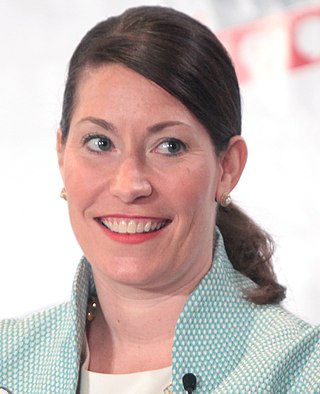
The 2014 United States Senate election in Kentucky took place on November 4, 2014, to elect a member of the United States Senate to represent the Commonwealth of Kentucky, concurrently with elections to the United States Senate in other states and elections to the United States House of Representatives and various state and local elections.

The 2015 Kentucky gubernatorial election took place on November 3, 2015. Incumbent Democratic Governor Steve Beshear was ineligible to run for a third term due to term limits. Primary elections were held on May 19, 2015.

A general election was held in the U.S. state of Kentucky on November 3, 2015. All of Kentucky's executive officers were up for election. Primary elections were held on May 19, 2015.

The 2016 United States Senate election in Kentucky was held November 8, 2016 to elect a member of the United States Senate to represent the State of Kentucky, concurrently with the 2016 U.S. presidential election, as well as other elections to the United States Senate in other states and elections to the United States House of Representatives and various state and local elections. The primaries were held May 17.
Gerald G. Lundergan is an American businessman, politician and member of the Democratic Party from the Commonwealth of Kentucky. He served in the Kentucky House of Representatives from 1980 to 1985 and 1987 to 1989 and has served as Chairman of the Kentucky Democratic Party on two occasions. In September 2019, he was convicted in federal court of providing illegal corporate campaign contributions to his daughter, then Secretary of State of Kentucky Alison Lundergan Grimes’ 2014 failed U.S. Senate campaign.

A general election was held in the U.S. state of Kentucky on November 5, 2019, with all executive offices in the state up for election. Primary elections were held on May 21, 2019.

The 2019 Kentucky Attorney General election was conducted on November 5. Primary elections occurred on May 21, 2019. The general election was held on November 5, 2019. Incumbent Democratic Attorney General Andy Beshear declined to seek reelection to a second term to instead successfully run for Governor. Republican nominee Daniel Cameron won with 57.8% of the vote. He became the first Republican elected attorney general of Kentucky since Eldon S. Dummit in 1944, and the state's first black attorney general.
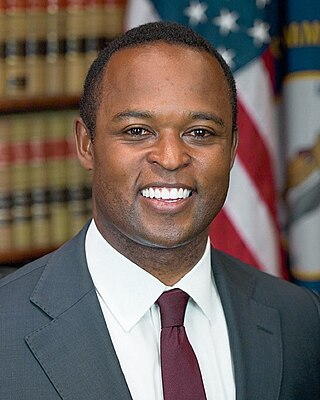
The 2023 Kentucky gubernatorial election was held on November 7, 2023, to elect the governor and lieutenant governor of Kentucky. Incumbent Democratic governor Andy Beshear won re-election to a second term, defeating Republican state attorney general Daniel Cameron. Had Cameron won, he would have become Kentucky's first African American governor.




